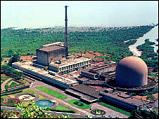Nuclear Deal
US-India nuclear accord clears first hurdle

The US House of Representatives has approved a landmark nuclear deal with India, removing one of two final obstacles to a foreign policy victory for the Bush administration.
While the House approved the deal 298-117 on Saturday, it still faces a hurdle in the Senate. Several senators oppose the deal and could attempt to block a vote in the few days left before Congress recesses ahead of the November elections.
President George W. Bush and Manmohan Singh, the Indian prime minister, have both invested heavily in achieving the deal, which would pave the way for US companies to sell nuclear technology to India for the first time since Delhi tested a nuclear weapon in 1974.
Mr Bush said the House approval was "another major step forward in achieving the transformation of the US-India relationship" and urged the Senate to pass the legislation.
Mr Singh was cited by Bloomberg as saying before the vote yesterday: "India will be liberated from the constraints of technology denial of 34 years. It will add an important strategic pillar to our bilateral partnership. We will widen our clean energy options.''
The White House believes the nuclear accord will open a new chapter in relations with India by developing a closer alliance, which could help counter the rise of China. It also argues that the deal brings India's civilian nuclear reactors under international safeguards.
Critics have attacked the deal on several fronts, including criticising the House for approving the deal without the usual congressional examination.
Howard Berman, the chairman of the House foreign affairs committee, agreed to expedite the process by bypassing his committee, which would have debated the deal at the request of the administration. Henry Sokolski, head of the Nonproliferation Policy Education Center, said Congress should have taken time to place more stringent safeguards in the deal.
"It is outrageous that such a critical vote, one that will forever change the global non-proliferation regime, was taken without the benefit of full congressional review and oversight, as required by the law," said Edward Markey, a Democratic congressman from Massachusetts.
"This is a terrible bill that threatens the future of the global nuclear non-proliferation regime."
Some non-proliferation experts said the deal did not include sufficient safeguards.
Daryl Kimball, executive director of the Arms Control Association, pointed out that it permitted, for example, India to extract tritium gas, which can be used to increase the power of nuclear weapons, from its reactors.
(Published by The Financial Times - September 29, 2008)